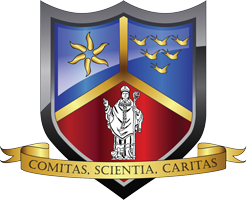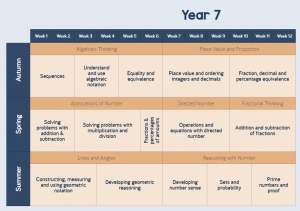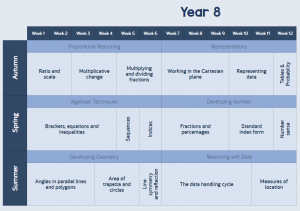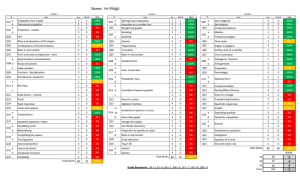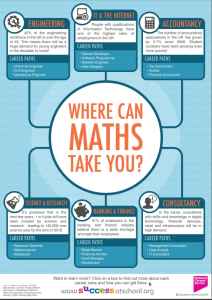Mathematics
Welcome to the Mathematics Department. Mathematics is a core subject with every pupil completing a full GCSE in KS4. Pupils experience excellent teaching from an enthusiastic mathematics team. Pupils experience challenge during their lessons and are encouraged to look beyond the classroom and apply the maths in context.
MEET THE DEPARTMENT
Mr Jacobs – Subject Leader of Mathematics & Assistant Principal
Mr Campbell – Teacher of Mathematics & Assistant Principal/Year 10 Pastoral Leader
Mr Clark – Teacher of Mathematics
Mr Downs – Teacher of Mathematics
Mr Eyre – KS3 Coordinator for Mathematics & Teacher of Mathematics
Miss Kent – KS4 Coordinator for Mathematics &Numeracy Coordinator
Miss Machin – Teacher of Mathematics & Curriculum Lead
Ms Rhodes – Teacher of Mathematics
Mr Rome – Teacher of Mathematics
Ms Vanvuchelen – Teacher of Mathematics and R.E.
Mrs Kerrigan – Teaching Assistant
Mr Trimby – Teaching Assistant
GCSE MATHEMATICS EXAM RESULTS
There is a strong culture of academic success in the department. We achieve consistently strong results and are always reflecting on our practice to see where we can make further improvements.
2023: 87% 9 – 4, 73% 9 – 5 (following return to national 2019 outcomes)
2022: 89% 9-4, 81% 9-5
2021: 93% 9-4, 77% 9-5 (Centre Assessed Grades)
2020: 90% 9-4, 73% 9-5 (Centre Assessed Grades)
2019: 83% 9-4, 65% 9-5
2018: 87% 9-4, 65% 9-5
2017: 83% 9-4; 55% 9-5
Key Stage 3 Curriculum
Overview
In September 2020 we introduced a new approach to mathematics at St Richards’ by incorporating and developing teaching for mastery ideas into our practice. The use of the phrase “teaching for mastery” refers to the classroom concepts and approaches that best help pupils to “master” the mathematics they are taught. These concepts and approaches include incorporating a new KS3 scheme of work where concepts are looked at for longer and in more depth with the aim of pupils’ achieving a deeper, more connected, and more fluid understanding of the mathematics they are taught.
Teaching for Mastery: 5 Big Ideas
As part of our move towards teaching for mastery we are working with the NCETM (National Centre for Excellence in the Teaching of Mathematics) and Sussex MathsHub and incorporating their “5 Big Ideas” which underpin teaching for mastery. These concepts form the foundations of the new scheme of work taught in year 7, with elements introduced into our teaching for the other year groups. These are:
- Coherence: Lessons are broken down into small connected steps to enable all pupils to access the ideas. These steps are then built up, leading to a generalisation of the concept and enabling pupils to apply their knowledge to a range of contexts.
- Representation and Structure: Concepts and ideas are represented in a range of ways, developing from the ‘concrete’ such as using Dienes blocks, onto the ‘pictorial’ and the use of bar models and number lines, through to the ‘abstract’. The aim is for all pupils to be able to complete the maths without relying on the physical or pictorial representation, but it is used when teaching concepts for the first time to provide sufficient meaning and understanding with key ideas.
- Mathematical Thinking: For ideas to be truly understood pupils must engage with the ideas actively. Pupils are therefore encouraged to discuss and reason their ideas with each other and actively think about the mathematics concerned.
- Fluency: For pupils to be able to move onto higher level content, they must have fluency in their foundation knowledge, including times tables and other core numeracy ideas, such as number bonds, place value and both mental and written calculations. Developing fluency in mathematics enables pupils to move easily between different contexts and develop a strong understanding of the connections between different concepts.
- Variation: This is a concept that concerns not adding “variety” to lessons but focusing on how and why varying small parts of an idea or a question, can lead to changes in the answer. It is a very effective way of drawing pupils’ attention to core concepts, and encourages pupils to explore and think more deeply about mathematical relationship and structure.
Challenge and Support
Our belief is that all children can understand and succeed in mathematics. Each key stage 3 cohort has a booster class for pupils who find maths particularly challenging. In these lessons pupils focus on core topics which include the key numeracy concepts and skills. As part of our teaching for mastery approach, we have adapted the scheme of work further for these pupils to give them the time to really understand and practice key ideas that are required before moving onto further content.
As part of our teaching for mastery approach pupils study similar mathematical concepts at the same time, regardless of their prior attainment. Support is provided through greater scaffolding. A core idea within teaching for mastery is that those pupils who grasp an idea quickly are not rushed on to new content, instead they cover the same content as all other pupils but are challenged further by exploring concepts in greater depth and given questions where they need to apply the ideas to new and unfamiliar problem-solving contexts.
For further detail regarding teaching for mastery ideas, please visit: https://www.ncetm.org.uk/teaching-for-mastery/mastery-explained/
https://www.ncetm.org.uk/media/q0ykgtje/secondary-teaching-for-mastery-december-2017.pdf
The curriculum map for KS3 teaching for pupils starting at the school from September 2020 is shown below.
Key Stage 4 Foundation Curriculum
KEY STAGE 4 FOUNDATION CURRICULUM
Pupils start formally studying for their GCSE mathematics exams at the start of Year 9. The course is split into two tiers higher and foundation.
The foundation units studied:
| Year 9 Content | Year 10 Content | Year 11 Content |
|---|---|---|
| Unit 1. Number | Unit 10. Transformations | Unit 19. Congruence, Similarity and Vectors |
| Unit 2. Algebra | Unit 11. Ratio and Proportion | Unit 20. More Algebra |
| Unit 3. Graphs, Tables and Charts | Unit 12. Right-angled Triangles | Mocks round 1 |
| Unit 4. Fractions and Percentages | Unit 13. Probability | Mocks round 2 |
| Unit 5. Equations, Inequalities and Sequences | Unit 14. Multiplicative Reasoning | Response to mock, analysis, intervention and revision |
| Unit 6. Angles | Unit 15. Constructions, Loci and Bearings | |
| Unit 7. Averages and Range | Unit 16. Quadratic Equations and Graphs | |
| Unit 8. Perimeter, Area and Volume 1 | Unit 17. Perimeter, Area and Volume 2 | |
| Unit 9. Graphs | Unit 18. Fractions, Indices and Standard Form |
If you would like more details for any of our units please click here(link to come) for individual lessons, misconceptions, content learnt and prior knowledge. Please note this is a suggested plan and timings may differ for individual classes.
There is a large amount of content in both tiers and it is important that pupils make the most of every lesson and complete additional independent work on areas for development.
Key Stage 4 Higher Curriculum
KEY STAGE 4 Higher CURRICULUM
Pupils start formally studying for their GCSE mathematics exams at the start of Year 9. The course is split into two tiers higher and foundation.
The Higher units studied:
| Year 9 Content | Year 10 Content | Year 11 Content |
| Unit 1. Number | Unit 10. Probability | Revision |
| Unit 2. Algebra | Unit 11. Multiplicative Reasoning | Unit 15. Equations and Graphs |
| Unit 3. Interpreting and Representing Data | Unit 9. Equations and Inequalities | Unit 19. Proportion and Graphs |
| Unit 4. Fractions, Ratio and Percentages | Unit 12. Similarity and Congruence | Revision |
| Unit 5. Angles and Trigonometry | Unit 13. More Trigonometry | Mocks round 1 |
| Unit 6. Graphs | Unit 14. Further Statistics | Mocks round 2 |
| Unit 7. Area and Volume | Unit 17. More Algebra | Response to mock, analysis, intervention and revision |
| Unit 8. Transformations and Constructions | Unit 16. Circle Theorems | |
| Unit 18. Vectors and Geometric Proof |
If you would like more details for any of our units please click here(link to come) for individual lessons, misconceptions, content learnt and prior knowledge. Please note this is a suggested plan and timings may differ for individual classes.
There is a large amount of content in both tiers and it is important that pupils make the most of every lesson and complete additional independent work on areas that they identify as development areas. We do offer intervention sessions that become extensive when pupils reach Year 11.
Assessment and homework in Mathematics
For every unit studied, pupils are assessed using a mixture of class, homework and formal end of unit assessment. Pupils are provided with written feedback on success and areas for development and are given the opportunity to address any misconceptions.
Pupils start formally studying for their GCSE mathematics exams at the start of Year 9. Their GCSE exam consists of three papers at either foundation (aiming for grades 1 – 5) or higher (aiming for grades 4 – 9) tier, each 90 minutes long. The maths GCSE is composed of three 90 minute examinations. The first of the exams is a non-calculator exam so it is important that pupils have mastered the essential numeracy skills covered earlier in their school career. The other two papers allow the use of a calculator.
Pupils will begin to sit full GCSE papers as mock examinations from the end of year 10. Pupils are given detailed feedback of their performance after every mock exam series in year 11 showing the areas of the course that each pupil needs to work on in order to progress.
Year 11 pupils receive a detailed QLA(question level analysis) that creates a bespoke revision guide for each pupil.
Homework
Pupils are set two pieces of homework per week in Maths. The department make use of three websites for the majority of homework tasks. Year 7 pupils will utilise Times Table Rock Stars, alongside MathsWatch and Hegarty Maths. Years 8-11 will receive a combination of online (MathsWatch and Hegarty Maths) and paper based homeworks. MathsWatch and Hegarty Maths contain support videos attached to the majority of questions. This allows pupils to access support and seek further explanation to support them with their work at home. Please do remind your child of this feature if they are in need of additional support
Careers in Mathematics
Careers- Where can a qualification in maths take St Richard’s pupils?
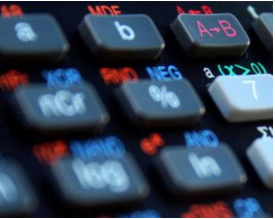 The career possibilities can be endless with qualification in maths. In the same way that languages provides your child with the building blocks and rules we need to communicate, maths uses its own language to explore the rules we need to measure or identify essential problems like distance, speed, time, space, change, force and quantities. Studying maths helps us find patterns and structure in our lives. Practically, maths helps us put a price on things, create graphics , build websites, build skyscrapers and generally understand how things work or predict how they might change over time and under different conditions.
The career possibilities can be endless with qualification in maths. In the same way that languages provides your child with the building blocks and rules we need to communicate, maths uses its own language to explore the rules we need to measure or identify essential problems like distance, speed, time, space, change, force and quantities. Studying maths helps us find patterns and structure in our lives. Practically, maths helps us put a price on things, create graphics , build websites, build skyscrapers and generally understand how things work or predict how they might change over time and under different conditions.
Maths is one of the best subjects to develop your child’s analytical, research and problem-solving skills. Not only will studying maths help give them the knowledge to tackle scientific, mechanical, coding and abstract problems, it will also help them develop logic to tackle everyday issues like planning projects, managing budgets and even debating effectively.
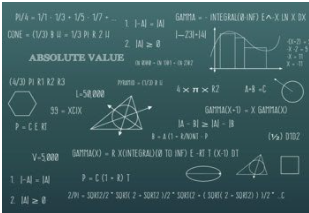 Maths A-level is a must have for your child if they wish to pursue degrees in: physics, engineering, actuarial science, economics and, of course, maths, although your child may need to study a further maths course as well to do this.
Maths A-level is a must have for your child if they wish to pursue degrees in: physics, engineering, actuarial science, economics and, of course, maths, although your child may need to study a further maths course as well to do this.
Maths is recommended for: computer science, accounting, chemistry, biology and life sciences, medicine/nursing, dentistry, business studies, management studies, finance, architecture, geology, psychology, surveying and even philosophy.
Some subjects, like medicine, require two out of this common group of four subjects: maths, physics, chemistry and biology. So although you might not need to study a maths degree to progress, your child must take at least two of the other subjects instead.
Maths is also crucial for studying advanced apprenticeships in accountancy and technology and engineering subjects. People with maths degrees and other qualifications can go into: accounting, medicine, engineering, forensic pathology, finance, business, consultancy, teaching, IT, games development, scientific research, programming, the civil service, design, construction and astrophysics to name a few. Specific job roles include actuary, business analyst, software engineer, technology analyst, information engineer, speech technology researcher, and maths teacher.
- Wherecanstemtakeyou.co.uk – Find out more about what you can do with skills in maths, engineering, technology and science subjects.
- Mathscareers.org.uk – This site is packed full of advice for every stage of your education. Have a go at their career quiz and see where your maths skills could take you.
- Is further maths A-level for me? Undecided? maybe this flow chart can help you figure it out.
- GCSE Bitesize maths revision A great website for students who need maths help.
Extra Curricular Opportunities in Mathematics
Extra Curricular Opportunities:
There are plenty of opportunities throughout the school year for pupils to utilise their maths skills outside of curriculum time. Pupils can engage with their love of the subject through UKMT Maths challenge team events, Maths enrichment activities and the numerous Maths week activities held annually.
There is also opportunity for extra support with their maths outside of lesson time through weekly interventions, and revision sessions as well as Prep club plus to gain supported help with homework and drop in homework support sessions. If your child wishes to get involved in extra curricular maths activities please encourage them to talk to their maths teacher.
